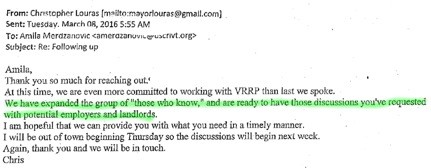Last year, the mayor of a small town in Vermont met in secret with representatives of the refugee resettlement industry, offering his town as a new resettlement destination for unvetted Syrian migrants. In beginning these negotiations, Rutland mayor Chris Louras violated the city charter and set off a firestorm of protest throughout the city and in surrounding communities.
The mayor announced the proposal in late April to resettle a hundred Syrian refugees beginning in October of this year. While he hid the negotiations from the rest of the local government and its citizens, Louras engaged with the Vermont Refugee Resettlement Program (VRRP), a field office of the U.S. Committee for Refugees and Immigrants (USCRI). USCRI is one of nine private contractors called “Voluntary Agencies” or VOLAGs, authorized by the State Department to resettle refugees.
A public records request has revealed extensive details of how this plan was hatched.
From the start, those involved stressed secrecy in order to prevent criticism from voices in the community. Vermont Refugee Resettlement Program Director Amila Merdzanovic said “I cannot emphasize enough the importance of not sharing the information… move slowly, keep it to a small circle of people, and then expand.” In an email to Louras, she stated, “if we open it up to anybody and everybody, all sorts of people will come out of the woodwork. Anti-immigrant, anti-anything.”
Merdzanovic later told ABC News that, “in this work, you’re gonna offend people. Whether you include them or not include them, you’re gonna offend them. So sometimes you just have to make that hard decision” to deceive the citizens who will be impacted by these decisions.
Secrecy is also essential because those involved need to line up support from vendors, non-profits and others who will feed off the flood of taxpayer dollars that accompany refugee resettlement.
The U.S. Committee for Refugees and Immigrants received $52 million in 2015 to resettle approximately 9,000 refugees, translating to about $5,800 per head. This doesn’t take into account taxpayer spending on welfare programs for refugees or the many grants available to refugees through the Department of Health and Human Services Office of Refugee Resettlement.
The secrecy in which the refugee resettlement process is conducted lends itself to the appearance of conflicts of interest, fraud and pay-for-play allegations. There is virtually no transparency and a lot of money in government contracts at stake.
In an email dated March 8, 2016, retrieved through a public records request, the mayor wrote to Merdzanovic, “We have expanded the group of ‘those who know,’ and are ready to have those discussions you’ve requested with potential employers and landlords…”
Merdzanovic responds excitedly in a later email, “As it turns out, one of our English teacher’s brothers is a major landlord and an employer in Rutland…”
On May 25, Rutland’s Board of Aldermen invited the Vermont Refugee Resettlement Program’s Merdzanovic and USCRI’s Director of Community Relations Stacie Blake to answer questions at a public meeting. The meeting revealed a well of hostility toward the resettlement agencies and the mayor for deliberately going behind their backs.
Residents repeatedly complained about the secrecy shrouding the resettlement process, and demanded the mayor and the resettlement contractors allow the community to decide the issue.
A citizen’s organization called Rutland First rapidly formed to protest the mayor’s actions. It has petitions for both the town and city to put the resettlement program to a vote.
James Simpson is an economist, former White House budget analyst, businessman and investigative journalist. Follow Jim on Twitter & Facebook.



COMMENTS
Please let us know if you're having issues with commenting.